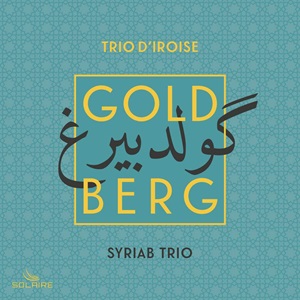
Johann Sebastian Bach (1685-1750)
Goldberg Variations (publ. 1741)
Trio d’Iroise
Syriab Trio
rec. 2022, Adelbrinsaal, Kloster Drübeck, Germany
Solaire SOL1015 [85]
Ever since becoming a hit LP through Glenn Gould’s 1955 recording, J S Bach’s Goldberg Variations has been a goldmine for musicians looking for something all-embracing and popular, a universal universe of music that has it all, from lyrical to rhythmic, and from light-hearted to emotionally probing, and all playable on just about any instrument or combination of instruments you can imagine. The Goldberg Variations is, and I suspect always will be, in a state of re-invention and rediscovery, but with such a now ubiquitous masterpiece it’s increasingly hard to create something truly memorable.
Recordings of this work with string trio are by no means uncommon these days, and Trio Zimmermann on the BIS label (review) is as good as any if you are looking for a complete version with this instrumentation. This recording on Solaire is however something entirely different. The performance commences with string trio alone, and we’re into variation four by the time anything exotic begins to happen. Trio D’Iroise, the string trio, has made their own arrangement of the Goldberg Variations and the Syriab Trio has joined forces with them to expand the whole musical language of the piece to embrace the Maqams or keys and styles of improvisation involved in Arabic music, the entire cross-pollination also involving the musicians of the Syriab Trio in Bach’s “severity”.
Listening initially in the car just to get the flavour of the disc, I was beginning to wonder if I had the right CD as we have a good 10 minutes or so of string trio playing to start with. Variation 4 combines nicely pizzicato strings with oud however, and after this we know we are embarking on a different world of sound. The energy of Variation 5 is heightened with complex cross-rhythms from the percussion, and the colours of Variation 6 are embellished with oud, and some nice descending gestures from the kanun, which is a zither-like instrument. I could go through each variation, but hopefully you get the idea. This is a Goldberg Variations which sees Bach as a starting point, holding onto the integrity of the original for large parts of the recording, but blending two seemingly disparate worlds into an often surprisingly effective and by no means disagreeable whole. There are some truly beautiful moments, such as the soft drum that precedes Variation 9, which then turns out to be in tune as a bass note within the tonality of the strings. Variation 11 is the first place where the Syriab Trio goes off entirely into their own idiom, Bach’s notes taking over to conclude with almost seamless ease. There are dialogues and interludes, and arrangements where all instruments have an equal solo role within Bach’s counterpoint, but the influence of the Arabian musical element takes on an ever-stronger role as the work progresses. Variation 15 is preceded by an entire separate section including singing, with the actual variation appearing as a kind of coda. You’re going to need to like this melismatic style of singing, and we’re getting into quarter-tone tunings by the time we reach an exciting version of Variation 18, the string players of Trio d’Iroise getting stuck into and relishing the Maqam scales that transform Variation 19 into something rich and strange. With its animated percussion the version of Variation 22 is joyous, the following piece an atmospheric meditation by way of contrast, Bach’s notes now becoming a single line. The eloquent Variation 25 is for strings alone, but with our ears educated into hearing where external influences have been absorbed, giving the music a moving emotive depth.
Beautifully played and sensitively recorded in a fairly intimate but by no means dry space, this is one of those recordings you are going to have to try for yourself, but whatever happens do not expect a conventional set of the Goldberg Variations. I have nothing against this kind of musical meeting of different styles and traditions, but whether you like this or not will be entirely down to personal taste. I have played in Eastern European bands with comparable instruments and stylistic characteristics, but as a classically trained musician always felt a bit of a fraud, having to read the notes from a page when others knew the music as well as they knew how to breathe. As a result, I can very much appreciate and admire the expertise of these musicians and the amount of work they have put into making this a musically effective and unique project, crowned with special applause for the Solaire label for backing them.
Dominy Clements
Help us financially by purchasing from

Performers
Trio d’Iroise: Sophie Pantzier (violin), François Lefévre (viola), Johann Caspar Wedell (cello)
Syriab Trio: Abdalhade Deb (oud, voice), Ibrahim Bajo (kanun), Amjad Sukar (percussion)

















